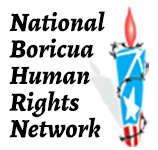What happened today
On Wednesday, January 5, after a remarkably biased and tainted parole hearing, U.S. Parole Commission hearing examiner Mark Tanner announced he would recommend that Puerto Rican political prisoner Oscar López Rivera be denied parole, and that he either be held in prison until his mandatory release date in 2023 or serve another 15 years before being reconsidered for parole, whichever comes first.
Oscar was brought to the hearing handcuffed to a chain around his waist. His attorney Jan Susler’s protestations were overruled, with prison staff asserting the warden had ordered the highly unusual measure. Eight Bureau of Prisons personnel constituted an exaggerated and intentionally intimidating presence.
Over the vehement objection of Oscar’s attorney, Tanner entertained live testimony from four people he characterized as “victims” — a wounded survivor and family members of people who died in the 1975 explosion in New York’s Fraunces Tavern — even though Oscar was never accused or convicted of anything related to the explosion.
Susler, noting that the Puerto Rico Bar Association had petitioned for observer status at the hearing, but that the Parole Commission failed to respond to the request of that venerable institution, vehemently objected to the observer status of retired FBI agent Donald Wofford. Tanner overruled her objections.
Tanner provided Susler a 7 page letter from Chicago U.S. Attorney Patrick Fitzgerald, a political diatribe opposing parole, listing acts unrelated to Oscar and unsupported conclusions about his role in the clandestine movement.
Tanner first interrogated Oscar about his role in the offense, insisting that he admit or deny his guilt and, further, that he talk about his role in the FALN, the seditious conspiracy, and the conspiracy to escape. Insisting that Oscar was a leader, Tanner was not interested in Oscar’s recounting of his own history of having been drafted into the infantry to fight an unjust U.S. war against the people of Vietnam. He was equally uninterested in Oscar’s recounting of the history of repression of and violence against the independence movement, as well as the history of the Bureau of Prisons’ sting operations and false accusations against him.
Tanner demonstrated more interest in what the “victims” had to say, and paid close attention to their misinformed vitriol and name-calling spewed against Oscar.
Susler attempted to bring Tanner’s attention to the matter at hand, reciting the criteria for release on parole and demonstrating how the evidence proved that Oscar meets the criteria:
1) that in the past 20 years of prison, he has not been accused of a violating a single prison rule;
2) that his release would not depreciate the seriousness of the offense or promote disrespect for the law; and 3) that release would not jeopardize the public welfare.
She pointed out President Clinton’s determination in 1999 that Oscar’s sentence was disproportionately lengthy and that his offer of clemency would have resulted in Oscar’s release in September of 2009. She focused Tanner on the fact that the political prisoners released as a result of the Clinton clemency are productive citizens, fully integrated into civil society. She noted the Parole Commission’s decision to release Carlos Alberto Torres in July of 2010. And she recited in detail the support for his release from virtually the entire civil society in Puerto Rico, drawing Tanner’s attention not only to the support letters from thousands of people, but noting the support from the pro-statehood resident commissioner to the U.S. Congress who represents the close to 4 million people of Puerto Rico.
Oscar’s statements and those of his lawyer fell on deaf ears. While Tanner admitted that Oscar had the best possible Salient Factor score, and that he had served 356 months, which he characterized as “way beyond” the guidelines minimum requirement of 100 months, he nevertheless announced his negative recommendation. Susler immediately responded that such a recommendation ignored the express will of the Puerto Rican people and their supporters.
The recommendation denying parole was the goal of the right wing, which in the few days prior to the parole hearing, created an environment of lies and innuendos in the media, reminiscent of the right wing reaction to the 1999 clemency. They barraged the Parole Commission with phone calls opposing parole. However, when Oscar’s supporters called, the Commission stopped answering the phones.
Plan of action
The NBHRN will be mounting a campaign to ask the Parole Commission to reject Tanner’s recommendation and to order Oscar’s release on parole. We will be asking people to:
- Collect signatures on a new letter to the Commission, thinking more broadly in terms of different sectors to approach;
- Phone the Commission with messages of support for Oscar’s release;
- Thank the elected officials, religious and community leaders for their support and encourage them to write another letter to ask the Commission to reject the recommendation and to order Oscar’s release;
- Form delegations of influential people to ask for meetings with the Commission;
- Write to Oscar and express support.
The NBHRN is scheduling a nat’l conference call for this weekend. We will be sending a follow up email shortly afterwards.
Thank you all for your work on behalf of the Network and Oscar López Rivera. Together, we will free him..
Alejandro


